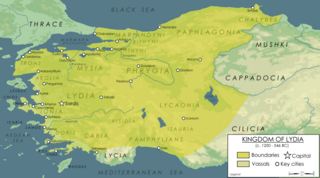Related Research Articles

Alyattes, sometimes described as Alyattes I, was the fourth king of the Mermnad dynasty in Lydia, the son of Sadyattes, grandson of Ardys, and great-grandson of Gyges. He died after a reign of 57 years and was succeeded by his son Croesus.

Lydia was an Iron Age kingdom situated in the west of Asia Minor, in modern-day Turkey. Later, it became an important province of the Achaemenid Empire and then the Roman Empire. Its capital was Sardis.
The 6th century BC started on the first day of 600 BC and ended on the last day of 501 BC.

The 7th century BC began the first day of 700 BC and ended the last day of 601 BC.
The 8th century BC started the first day of 800 BC and ended the last day of 701 BC. The 8th century BC was a period of great change for several historically significant civilizations. In Egypt, the 23rd and 24th dynasties lead to rule from Kingdom of Kush in the 25th Dynasty. The Neo-Assyrian Empire reaches the peak of its power, conquering the Kingdom of Israel as well as nearby countries.
This article concerns the period 589 BC – 580 BC.
This article concerns the period 639 BC – 630 BC.
This article concerns the period 719 BC – 710 BC.

Croesus was the king of Lydia, who reigned from 585 BC until his defeat by the Persian king Cyrus the Great in 547 or 546 BC. According to Herodotus, he reigned 14 years. Croesus was renowned for his wealth; Herodotus and Pausanias noted that his gifts were preserved at Delphi. The fall of Croesus had a profound effect on the Greeks, providing a fixed point in their calendar. "By the fifth century at least", J. A. S. Evans has remarked, "Croesus had become a figure of myth, who stood outside the conventional restraints of chronology."
The year 619 BC was a year of the pre-Julian Roman calendar. In the Roman Empire, it was known as year 135 Ab urbe condita. The denomination 619 BC for this year has been used since the early medieval period, when the Anno Domini calendar era became the prevalent method in Europe for naming years.
Sadyattes was the third king of the Mermnad dynasty in Lydia, the son of Ardys and the grandson of Gyges of Lydia. Sadyattes reigned 12 years according to Herodotus.

Cyaxares was the third king of the Medes. He ascended to the throne in 625 BCE, after his father Phraortes lost his life in a battle against the Assyrians.
Madyes was a Scythian king who ruled during the period of the Scythian presence in West Asia in the 7th century BCE.

The Battle of the Eclipse was fought in the early 6th century BCE in Anatolia between the Medes and the Lydians. According to ancient Greek historian Herodotus, the battle was interrupted by "day turning into night" – presumably a solar eclipse – and the result was a draw which led to both parties negotiating a peace treaty and ending a six-year war.

The eclipse of Thales was a solar eclipse that was, according to ancient Greek historian Herodotus, accurately predicted by the Greek philosopher Thales of Miletus. If Herodotus' account is accurate, this eclipse is the earliest recorded as being known in advance of its occurrence. Many historians believe that the predicted eclipse was the solar eclipse of 28 May 585 BC. How exactly Thales predicted the eclipse remains uncertain; some scholars assert the eclipse was never predicted at all. Others have argued for different dates, but only the eclipse of May 585 BC matches the conditions of visibility necessary to explain the historical event.
Ardys was the son of Gyges of Lydia, whom he succeeded as the second king of the Mermnad dynasty.

The Lydian–Milesian War was a military conflict between the Kingdom of Lydia and the ancient Greek city state of Miletus. It took place during the 7th century BC in the Archaic period, traditionally set between 612 and 600 BC. The main source of the war is Herodotus, who wrote about it in the opening chapters of his Histories. The war ended after 12 years when the tyrant of Miletus, Thrasybulus of Miletus, convinced the Lydian king Alyattes to sue for peace with a ruse, after which an alliance between the two states was forged. Amongst other things, the length of the war has caused debate among modern historians.
Labinetus or Labynetus is a name that probably refers to the kings of the Chaldean dynasty in general. The Hellenized form of the name occurs only in Herodotus' Histories.
References
- ↑ Asimov, Isaac (1965) The Greeks, Boston: Houghton Mifflin, p. 91
- 1 2 Dale, Alexander (2015). "WALWET and KUKALIM: Lydian coin legends, dynastic succession, and the chronology of Mermnad kings". Kadmos. 54: 151–166. doi:10.1515/kadmos-2015-0008 . Retrieved 10 November 2021.